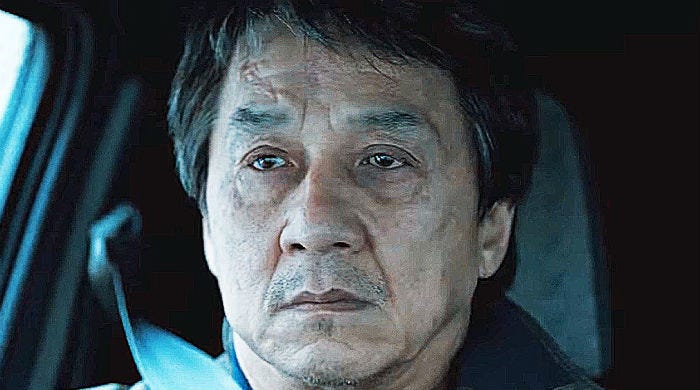Everyone please welcome Jackie Chan to 2017

Jackie Chan is sitting in a chair.
Early on in the 2017 movie The Foreigner, 63-year-old Jackie Chan as aggrieved father Quan Ngoc Minh is face to face with Commander Richard Bromley, one of Scotland Yard’s officers given the task of finding those who bombed a department store. Minh’s daughter was one of the 12 killed. He pleads and attempts to bribe the officer to give him the names of the terrorists, but is brushed aside, given the routine condolences and sent away. This all seems like boilerplate film material, until Minh attempts to get out of the chair. It’s not easy. He stumbles a bit, slowly rising and then proceeds to halfheartedly thank the commander for the sympathies and then limps away.
This is a Jackie Chan movie, but it’s not a Jackie Chan movie. Yes, Chan kicks and slides down lampposts and jumps abnormal distances, but unlike his past work of more than 100 films, there’s a gritty realism undercoating the film. It has all of the makings of Chan’s cinematic predecessors, yet it feels grounded in the world we live in today.
Although based on a 1992 thriller novel called The Chinaman, The Foreigner feels like a direct statement on the political spectrum today. As a Londoner, Chan takes it into his own hands to brawl with those in power in Ireland — who planted the bombs — and find a bit of retribution for his daughter. Through gray tones and a score that could be a transplant from the Bourne series, the second half of the film almost feels like a dream sequence. Chan will right the wrongs committed and he will not be stopped no matter the amount of armed men sent his way. It’s a direct parallel to the common sensation many citizens of the world feel after the latest terrorist attack. “I’m powerless. But what if I wasn’t?” The Foreigner brings that wish to life through an ancient, exhausted version of Jackie Chan that after his daughter’s death becomes a vessel for fury and vengeance.
Directed by Martin Campbell of Casino Royale fame, Chan gives a performance that is best exemplified by the scars across his face throughout the duration of the movie. Like Die Hard’s protagonist John McClane, Minh wears the pain of earlier events, a far cry from the Rush Hours and Shanghai Noons we came to know him through.
Clocking in at just under two hours, the film certainly loses its way throughout. It jumps to the perspectives of the terrorists seemingly out-of-nowhere, becomes semi-incestual and then ridicules journalists for a spell — because why not nowadays? — but the through line of Minh seeking redemption is captivating. The Foreigner doesn’t always seem to know what it wants to be, best exemplified by one gruesome scene showing spikes going through a foot and then not showing an important kill just a bit later, nevertheless Chan’s character is relatable throughout.
From the opening scene, it seems that the goal of Campbell is to have the audience live vicariously through Minh, hooting and hollering at his small victories along the way. In fact this movie is almost a stress releaser, even with the bodies strewn needlessly. Minh is a man on a mission, a la Liam Neeson in Taken, thus the momentum of the film carries the audience along even when the plot gets foggy.
On second thought, Jackie Chan is not really sitting in that chair.
Quan Ngoc Minh is. Mad and frustrated by the evils of life, Minh is all of us. This is the 2017 version of a Jackie Chan movie. We’ve seen the beats of this movie before, but in the world that we currently live in, witty one-liners and kicks to the nuts simply won’t do. Heartbroken, Minh struggles to get out of the chair.
Eventually he does. And he walks out, slowly but surely, into the future. A world where he may win.
